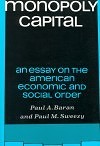Capitalism
Manufacturing America’s Dreams
Auto companies shield their low-tech exploitation of workers behind high-tech displays of mechanical prowess. The less a consumer knows about the blood and guts of manufacturing, the easier it is to buy the dream. So how does America think all this crap gets built?… Last summer, in a desperate attempt to entice young viewers to buy grandpa’s dream car, General Motors (GM) ran a TV ad that featured a chorus line of robot arms dancing to techno music around a series of Cadillacs strutting like runway models on chrome-plated wheels.… Don’t let yourself be seduced and deluded. The auto industry’s master talent isn’t robotics, it’s the ability to automatize humans—including drivers. | more…
A Rational Agriculture Is Incompatible with Capitalism
From humanitarian and ecological viewpoints, many aspects of the capitalist economic system are irrational; although they are certainly rational from the more limited standpoint of the individual business or capitalist seeking to make profits.… With regard to the environment there are scores of examples of irrational behavior by capitalist businesses that have the ultimate goal of making profits. Many practices and side effects of the way the system functions degrade the ecosystem and its processes on which we depend and may also directly harm humans. For example, it is not rational to introduce chemicals into the environment, including into products we use daily, that are either toxic or cause illnesses of various types. Yet there are over 80,000 chemicals used in the United States; few of them are tested for their effects on people or other species, and many commonly used ones are suspected to be carcinogens or have other detrimental effects. | more…
Crossing the River of Fire
The Liberal Attack on Naomi Klein and This Changes Everything
Naomi Klein’s new book, This Changes Everything [argues that the source of the looming crisis from climate change] is not the planet, which operates according to natural laws, but rather the economic and social system in which we live, which treats natural limits as mere barriers to surmount. It is now doing so on a planetary scale, destroying in the process the earth as a place of human habitation.… In the age of climate change, Klein argues, a system based on ever-expanding capital accumulation and exponential economic growth is no longer compatible with human well-being and progress—or even with human survival over the long run.… In this way Klein…signals that she has now, in William Morris’s famous metaphor, crossed “the river of fire” to become a critic of capital as a system.… [This] has led to a host of liberal attacks on This Changes Everything, often couched as criticisms emanating from the left. These establishment criticisms of her work, we will demonstrate, are disingenuous, having little to do with serious confrontation with her analysis. Rather, their primary purpose is to rein in her ideas, bringing them into conformity with received opinion. If that should prove impossible, the next step is to exclude her ideas from the conversation. | more…
Native Land and African Bodies, the Source of U.S. Capitalism
Had Marx written Capital in the early twenty-first century, knowing what he could not discern in 1867—that the global dominance of capital, through the military and imperialism, would be realized by the United States—this is the book he may have written using the methodology he developed in the mid-nineteenth century.… What Walter Johnson desires is to change entirely the way we think about the history of the United States, particularly the development of capitalism. He also wants to change how we think about the application of dialectical materialism to the United States. Like Marx, Johnson marshals thick description to disclose the theses that emerge. | more…

Is Capitalism a Disease?
When health policy is looked at from the point of view of which issues involve a direct confrontation of fundamental, ruling-class interest, which ones involve simply relative benefits to a class, and which are relatively neutral, we can predict which kinds of measures are possible. This highlights the lie in the notion that society is trying to improve health for everybody. | more…

Boring From Within the Bourgeois Press: Part One
Eugene V. Debs may be my all-time favorite American and Karl Marx my all-time favorite journalist. But my employer for a decade was The Wall Street Journal, and for another decade it was the Los Angeles Times. | more…

The Uncontrollability of Globalizing Capital
We live in an age of unprecedented historical crisis. Its severity can be gauged by the fact that we are not facing a more or less extensive cyclic crisis of capitalism as experienced in the past, but the deepening structural crisis of the capital system itself. | more…

Our Kind of Marxist: An Interview With Staughton Lynd
In my opinion, American capitalism no longer has any use for, let’s say, 40 percent of the population. These are the descendants of folks who were brought over here in one way or another during the period of capital accumulation. They’re now superfluous human beings. | more…

The Political Economy of Hybrid Corn
In bourgeois society a violation of property rights is the supreme injustice. Hybrids provided a solution in agriculture. Commercial hybrids decrease the yield of the following generation. This means that farmers have to renew their seed every year. Hence, hybrids create a perpetual market for seed. | more…

Monopoly Capital: An Essay on the American Economic and Social Order
This landmark text by Paul Baran and Paul Sweezy is a classic of twentieth-century radical thought, a hugely influential book that continues to shape our understanding of modern capitalism. “This book… deals with a vital area of economics, has a unique approach, is stimulating and well written. It represents the first serious attempt to extend Marx’s model of competitive capitalism to the new conditions of monopoly capitalism.” — Howard J. Sherman, American Economic Review | more…